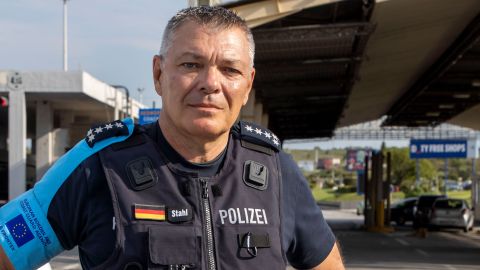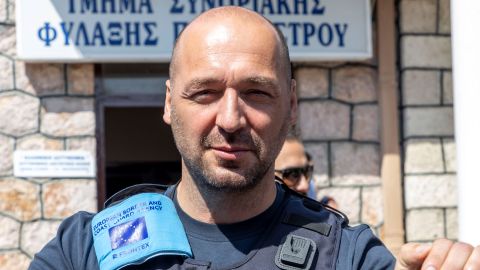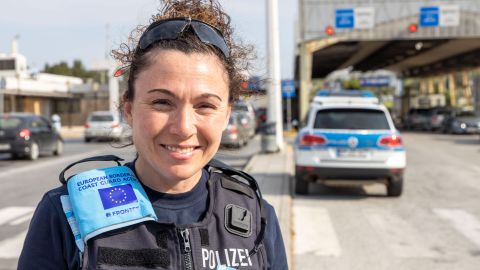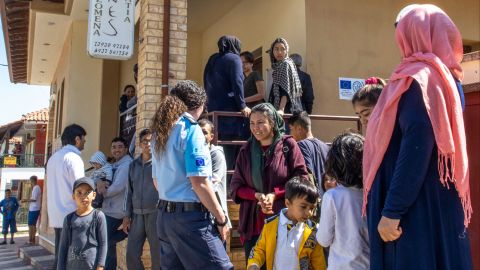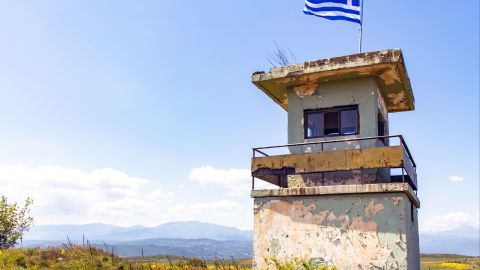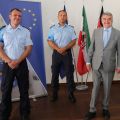The plain around the border town of Idomeni is also known as the "bottleneck of Europe". The border is easier to cross in the valley than elsewhere. In addition, the most important rail link from Greece to the north runs through this town. This is why many people pass through Idomeni on their flight. At the height of the wave of refugees in February 2016, there were violent riots here. People are still reaching the border, either on foot from Thessaloniki or as illegal passengers on freight trains. They jump off at Idomeni station and hide in the undergrowth or in empty buildings. I reach First Chief Superintendent Volker Stahl, Chief Superintendent Alexander Rankovic and Chief Superintendent Muna Mougawaz while they are still on site during their two-month mission.
People on the run
Muna Mougawaz encounters people every day who are trying to make their way to Central Europe and are taking great hardships to do so: "Yesterday we had a large group, all Syrians, which has been very rare recently. The sad thing was that there were also some children, the smallest was six months old. One of the group spoke very good English and said they had been sleeping with the baby in the forest for many days." The NRW officers rarely encounter resistance or opposition: "The people are quite happy when we pick them up," reports Mougawaz. They are often on the move for days on end, spend the night outside in wind and weather and don't know where to get food. Many have sore feet, wet shoes or dirty clothes. "We give them a roof over their heads, something to eat and drink and first aid. They can also charge their cell phones to make calls to relatives," says Mougawaz.
Physically demanding deployment
The police officers from North Rhine-Westphalia support the federal police on this mission. They are always on the road in a team with a colleague from the federal police and their Greek colleagues and work alternating shifts during the day and at night. Volker Stahl: "At night, FRONTEX colleagues from other countries drive so-called "Thermovision" vehicles, which are equipped with night vision devices to locate the people who have set off, and we then track them down." This work requires full physical exertion: "We sometimes have to walk several kilometers through wheat fields or thorny bushes at night," says Stahl. If you approach a group and they recognize the police officers, they run away. However, they are usually exhausted from their flight and are quickly caught up with. "After a mission like this, you come back sweaty and dirty and maybe with scratched arms because of the thorny bushes."
Language skills are helpful
Alexander Rankovic's good language skills are particularly helpful at work: "My father comes from Serbia. In addition to English, I also speak fluent Serbian and Greek. I can even translate for the Greeks when we're dealing with colleagues in North Macedonia." The assignments abroad are an important professional motivation for him: "This is the third time I've been here. I have found an area of work that I find very fulfilling and that makes a good change from my day-to-day work in Düsseldorf. It's exciting to work with colleagues from Lithuania, the Czech Republic, Poland, the Netherlands and other countries," says Rankovic.
His colleague Muna Mougawaz also benefits from her family background during this assignment: "My father is Syrian and I speak a few words of Arabic as well as English. That's why I was able to assess very well yesterday that it really was people from Syria that we picked up," she explains. These missions abroad also benefit her personally: "Once you've been on a mission at an external EU border, you get a completely different perspective on your own everyday life. It makes you appreciate how good things are at home," says Mougawaz. "The freedom to move around freely - you don't have that in other countries."
Well prepared for the mission
The three officers from NRW feel fully up to their task and are happy to do it, explains Volker Stahl: "We have been well prepared for the mission, we are well equipped, we always wear protective vests. The most important thing is that police officers from the federal government, NRW and Greece work as a team. With the necessary caution and self-protection, the situation is manageable. A Greek colleague once said: "One team, one family, one task." That sums it up perfectly."
NRW Minister of the Interior Herbert Reul: Reinforce FRONTEX deployment
The EU agency FRONTEX was founded in 2004. It secures the EU's external borders. It also provides operational assistance with people and equipment at the borders of the member states, fights crime there and supports repatriations. "We can't just say clever words about the need to secure the EU's external borders but not be prepared to help ourselves," said Interior Minister Herbert Reul during his visit to northern Greece. The North Rhine-Westphalian police are currently supporting the protection of the EU's external borders with seven police officers. Reul wants to double the number of police officers on the FRONTEX mission: "We miss everyone who leaves, but I believe that the task is important and that you learn an infinite amount abroad." Unlike many other EU expenditures, the FRONTEX mission is "an investment that citizens also approve of, because you can immediately see how necessary it is", said Reul.
